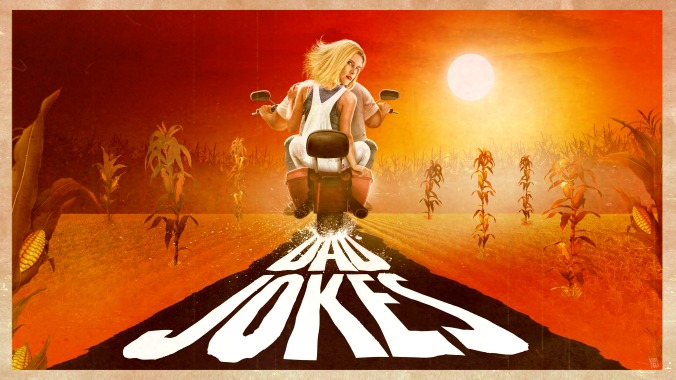Mo Welch Laughs Through Trauma in Docu-Special Dad Jokes

When queer cartoonist and comedian Mo Welch sent her estranged father a text message, asking for his help with a “little project” she was working on, she had no idea if he would actually show up. After over 20 years apart, he doesn’t exactly have the best track record.
In her explosively funny, fiercely irreverent, and dark debut special, Dad Jokes, Welch describes a concept known to her as a new mom, but one apparently lost on her own father: parenthood as an attendance mandatory phenomenon. Part-documentary and part-comedy special, Welch’s Dad Jokes showcases a gleefully harmless shock factor, a style of comedy Welch perfected throughout over a decade of sketch work, stand-up, and writing, and now, with her foray into long form comedic storytelling.
A successful performer, writer, and illustrator, she has notebooks filled with beats of black humor surrounding the subject of her elusive father; from her very first stand-up set, as well as her first ever cartoon published in the New Yorker, Welch told dad jokes. “It is kind of funny that I have all of these dad jokes,” she explains to me about the inspiration for her special’s premise, “and I don’t have a dad. Like, why have I always tried to talk about this?” Welch transformed the details of her stormy childhood into fodder for her career, never quite moving on from her father leaving, at least not completely, she shares during our phone conversation.
In her expert comedic hands, Welch makes the categorically unfunny issue of paternal abandonment strikingly hilarious. She began putting the “project,” as she calls her special, together when she started to run out of creative spins and unique angles on her complex childhood trauma. With a vague concept in mind about how to approach this deeply personal topic (she knew she wanted to film a documentary in her hometown and interview her father), Welch went searching for new material by going straight to the source.
While psychoanalysis is typically reserved for the confines of a clinical setting, Welch travels, together with a small and trusted film crew, to her hometown of Normal, Illinois in order to understand why she writes so many jokes about her relationship, or lack thereof, with her abusive father. In the film, Welch brings us on her journey to solve this existential mystery.
Intercutting the documentary footage with various instances of father comedy from her sets, Welch visits the prison where her dad got locked up during her childhood, the plot of land where the house they lived in was eventually condemned, and the domestic violence shelter she, her four siblings, and their mother escaped to when she was young.
-

-

-

-

-

-

-

-

-

-

-

-

-

-

-

-

-

-

-

-

-

-

-

-

-

-

-

-

-

-

-

-

-

-

-

-

-

-

-

-








































